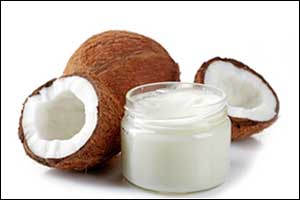- Home
- Editorial
- News
- Practice Guidelines
- Anesthesiology Guidelines
- Cancer Guidelines
- Cardiac Sciences Guidelines
- Critical Care Guidelines
- Dentistry Guidelines
- Dermatology Guidelines
- Diabetes and Endo Guidelines
- Diagnostics Guidelines
- ENT Guidelines
- Featured Practice Guidelines
- Gastroenterology Guidelines
- Geriatrics Guidelines
- Medicine Guidelines
- Nephrology Guidelines
- Neurosciences Guidelines
- Obs and Gynae Guidelines
- Ophthalmology Guidelines
- Orthopaedics Guidelines
- Paediatrics Guidelines
- Psychiatry Guidelines
- Pulmonology Guidelines
- Radiology Guidelines
- Surgery Guidelines
- Urology Guidelines
Coconut oil is pure poison, Harvard professor supports AHA Guideline

Adding fuel to the fire to the falsifying claims of coconut oil being a superfood following update of the American Heart Association (AHA) guidelines last year that recommended people to avoid the saturated fatty acids found in coconut oil. Now, in a lecture titled "Coconut Oil and other Nutritional Errors," by Karin Michels, the director of the Institute for Prevention and Tumor Epidemiology at the University of Freiburg and a professor at the Harvard TH Chan School of Public Health, in which she talks about coconut oil not "being healthy" is becoming a viral hit on YouTube.
Th title of the 50-minute German lecture is causing a bit of a stir online. During the lecture, Michels has made herself very clear with regard to dietary recommendations and underlined that coconut oil is not healthy.
Michels in her lecture labeled coconut oil as a "pure poison" and "one of the worst foods you can eat."
No study till now has shown significant health benefits associated with the consumption of coconut oil. And, according to Michels, coconut oil is more dangerous than lard because it almost exclusively contains saturated fatty acids, ones that can clog the coronary arteries. You can identify fats that contain large quantities of saturated fatty acids by checking to see whether they remain solid at room temperature, as is the case with butter or lard.
Also Read: Consuming coconut oil daily cuts heart disease risk
Based on the fact that they contain a lot of unsaturated fatty acids, experts recommend olive or rapeseed oil as an alternative, and while it can't be used for cooking, flaxseed oil is rich in omega-3 fatty acids and is just as good for the body.
While Michels doesn't describe other "superfoods" like acai, chia seeds, or matcha as harmful, at most she considers them ineffective because, in most cases, the nutrients they're touted for are available just as readily in other foods that are more easily accessible such as carrots, cherries, and apricots.
Most researchers agree that olive oil or linseed oil can form an important part of a healthy diet. While the scientific world is still debating whether saturated fatty acids really are the work of the devil, others say with certainty that that's the case.
However, a study published in the American Journal of Clinical Nutrition indicated that people who routinely consume cheese, whole milk, and other high-fat dairy products — in essence, products high in saturated fatty acids — are at no higher risk of dying from a heart attack, stroke, or other illness than those who avoid such products.
Another study using data from 135,000 people in 18 countries and published in The Lancet, found that high fat and low carbohydrate consumption were associated with a 23% lower risk of death. And, even more exciting, the positive effect still stands, regardless of whether saturated or unsaturated fatty acids are being consumed.
True to the saying that it is the dose that makes the poison, so if you have a soft corner for coconut oil, just go for it but be careful of not overindulging in it, as even many international dietary guidelines have recommended moderating the consumption of saturated fats.

Disclaimer: This site is primarily intended for healthcare professionals. Any content/information on this website does not replace the advice of medical and/or health professionals and should not be construed as medical/diagnostic advice/endorsement or prescription. Use of this site is subject to our terms of use, privacy policy, advertisement policy. © 2020 Minerva Medical Treatment Pvt Ltd